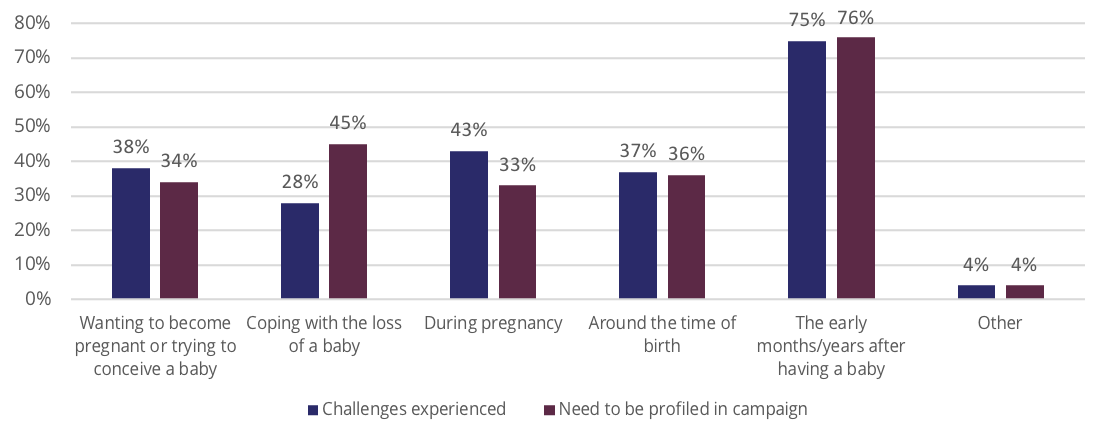Personal experiences of Hyperemesis Gravidarum
What the research had to say
COPE research undertaken with 1,899 consumers, revealed that 43 per cent of individuals identified challenges relating during pregnancy, with a number of them specifically describing living with Hyperemesis Gravidarum throughout the pregnancy.
 Source: Centre of Perinatal Excellence (2022)
Source: Centre of Perinatal Excellence (2022)
Below are the key themes identified pertaining to personal experiences of Hyperemesis Gravidarum. These themes informed the development of #thetruth campaign.
The unexpected complication in pregnancy
The unmet expectations for a positive pregnancy experience was likely also attributable to the significant number of responses pertaining to Hyperemesis Gravidarum or HG (severe, prolonged morning sickness experienced throughout pregnancy).
In particular, women described how HG was unexpected, and, as it lasted throughout the entire pregnancy, was extremely debilitating, impacting on all elements of their lives.
“I felt as if HG stripped me of my ability to feel like a human that contributed to my personal, work and social lives. It was debilitating and people just did not understand.”
Once again, low awareness and understanding of hyperemesis left people feeling misunderstood, isolated and without support. This also extended to health professionals and pharmacists.
“It’s not just morning sickness. I find that A LOT of health professionals have not got enough understanding or knowledge and push a lot of women away. We need to focus on our health department understanding and help the GP give the right support to women who suffer through the whole pregnancy not just in the first trimester.”
Debilitating impacts at the time
Experiencing hyperemesis had severe impacts upon the emotional and mental health of women throughout their pregnancy and beyond. It was also considered to have significantly contributed to the development of mental health conditions.
“The severity of HG left me feeling suicidal.”
“I developed and was diagnosed with PTSD from developing hyperemesis gravidarum during pregnancy.”
The impact of Hyperemesis was profound and widespread. Not only did it negatively affect physical and emotional wellbeing, it also prevented people from being able to work and/or care for other children. Financial impacts were further compounded by the fact that anti-nausea medication is not PBS listed and highly expensive.
“Unable to work and suffered financial losses. Had to move in with in laws. Teeth ceramic ruined from constant vomiting. Large medical expenses when taking 13 tablets a day and not entitled to any discount and not on pbs.”
Long-lasting impacts
The extent of the debilitating effects of hyperemesis was reflected in the fact that respondents were afraid of falling pregnant in the future.
“I am terrified of falling pregnant again and having to experience Hyperemesis again”
“(We) will never have any more children. Has affected bond with child.”
As a result, they sought to avoid becoming pregnant again, and/or even considered a termination of a much wanted pregnancy.
“It made me feel like I never want to go through pregnancy again. I shudder thinking about it. If I were to have a second child, I would consider adoption”
“Nausea and vomiting because the people I spoke to with severe morning sickness all found it unbearable and unrelenting and became depressed. One wanted to terminate, another found it hard to bond with the baby, and we all became depressed.”
Within the context of the often unexpected physical and emotional challenges of pregnancy, this in turn is likely to have had a significant impact on emotional and mental health.
Personal Profile – Cailtin’s Story
Sydney mother of two Caitlin, who is the founder of Hyperemesis Australia, experienced HG with both of her pregnancies.
Here, she shares her powerful story as part of COPE’s The Truth campaign.